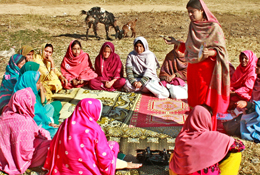Continuum of Care: Addressing Postpartum Hemorrhage in India and Nigeria
With funding from the John D. and Catherine T. MacArthur Foundation, Pathfinder worked to reduce India and Nigeria's maternal mortality and morbidity rates caused by postpartum hemorrhage.
The first phase of the project incorporated the three components of the Clinical and Community Action to Prevent Postpartum Hemorrhage: advocacy to promote government support, clinical interventions, and community engagement. In more extreme cases of shock resulting from severe postpartum hemorrhage, the non-pneumatic anti-shock garment (NASG) was used.
The NASG is a groundbreaking technology that evolved from a suit originally developed by NASA. The garment works to reverse life-threatening shock in women with severe postpartum bleeding until she can be transported to a high-level facility for treatment.
The project extended from the community, where women are most likely to give birth at home or community health centers, to higher level facilities where women can receive care for complications.
In Nigeria, the project was implemented in 60 health facilities in seven states, and in India, the RAKSHA (Sanskrit for "protection") project was implemented in four states including Bihar, Maharashtra, Rajasthan, and Tamil Nadu.
"Provider after provider reported seeing fewer cases of postpartum hemorrhage during facility deliveries, with some facilities not ever needing to use the anti-shock garment. . . . The data being collected in these facilities confirmed the providers' reporters: the incidence of postpartum hemorrhage in the program facilities is on a downward trend.
--- 2013 summary report commissioned by the MacArthur Foundation
In both Nigeria and India, the projects improved linkages between communities and health facilities by supporting the establishment of community-organized emergency transport systems and by pooling funds for emergencies. These systems are used to transport women to facilities for obstetric emergencies. Pathfinder also trained providers, mentored supervisors, and led facility upgrades to equip staff with delivery, surgical, and infection prevention materials. In Nigeria, Pathfinder provided an alternate source of running water.
Pathfinder’s project in India focused on building partnerships, supporting and strengthening existing health systems, and promoting the presence of skilled birth providers during delivery at all levels. The project successfully brought birth preparedness and complication readiness planning to thousands of women and families to address and prevent postpartum hemorrhage and pre-eclampsia.
An independent evaluation and report commissioned by the MacArthur Foundation in 2013 recognizes Pathfinder’s Continuum of Care approach and its ability to strengthen health systems and reduce rates of postpartum hemorrhage in project facilities.
“[The Clinical and Community Action to Address Postpartum Hemorrhage model] gives providers tools to use at each stage of need, from prevention to treatment. Although most of the interventions included in this continuum of care model are not new approaches, Pathfinder's packaging of the full range of interventions to address the problem of postpartum hemorrhage…was unique and we believe was what made a difference."
According to the report, another crucial part of the model’s success lies in the introduction of accountability and Pathfinder’s emphasis on monitoring and evaluation to promote program improvement. The report additionally recognizes Pathfinder’s strong advocacy efforts championing the coordinated approach to care in meetings with government officials, local leaders, organizations, and professional societies.
Watch Aisha's story

Related Publications
Research and Evaluation Working Paper Series
The purpose of the Working Paper Series is to disseminate work in progress by Pathfinder International staff on critical issues of population, reproductive health, and development.
Driving Innovation in Sexual and Reproductive Health
In 2012, Pathfinder went where the need was greatest—the places where women, men, and young people must fight every day to defend their sexual and reproductive health and rights. This annual report explores our successes during fiscal year 2012.
Nigeria's Clinical and Community Action to Address Postpartum Hemorrhage: Technical Update
With the support of the MacArthur Foundation, since 2007 Pathfinder International has implemented the Continuum of Care: Addressing Postpartum Hemorrhage project to prevent and manage PPH in India and Nigeria.
Related Projects

ANANYA: Shaping Demand and Practice in Bihar for Uptake of Priority Behaviors
PAST PROJECT: ANANYA aims to empower women to make informed decisions about maternal and neonatal health.

Building Blocks for FP2020 in Pakistan and Nigeria
Building Blocks for FP2020 supports and advances family planning in Nigeria and Pakistan, two countries that have made ambitious goals for improving access to reproductive health care in the next decade.
Community Actions to Improve Safe Motherhood in Charanchi, Katsina State, Nigeria under the Population and Reproductive Health Capacity Building Program
PAST PROJECT: The project provided capacity building support for two local community-based organizations, including the rollout of Pathways to Change, and mobilized the organizations to identify barriers in the use of quality maternal health services.
RELATED NEWS
Pathfinder Seeks Collaboration With Niger State On Reproductive And Maternal Health
Pathfinder has indicated interest to support Niger State Government’s through an holistic health reform agenda to provide affordable and qualitative healthcare services for Nigerlites.
Pathfinder Seeks Collaboration With Niger State On Reproductive And Maternal Health
Pathfinder has indicated interest to support Niger State Government’s through an holistic health reform agenda to provide affordable and qualitative healthcare services for Nigerlites.











